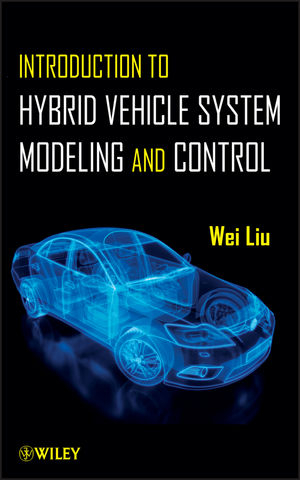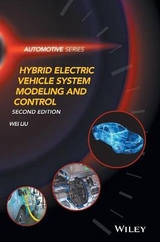
Introduction to Hybrid Vehicle System Modeling & Control
John Wiley & Sons Inc (Verlag)
978-1-118-30840-0 (ISBN)
- Titel erscheint in neuer Auflage
- Artikel merken
* Offers algorithm implementations and figures/examples extracted from actual practice systems * Suitable for a training course on hybrid vehicle system development with supplemental materials An essential resource enabling hybrid development and design engineers to understand the hybrid vehicle systems necessary for control algorithm design and developments.
WEI (KEVIN) LIU, PhD, is an Engineering Specialist at General Motors. He has twelve years of hybrid electric vehicle engineering experience and fifteen years of academic experience.
Preface xv Nomenclature xix Abbreviations xxv 1 Introduction 1 1.1 General Architectures of Hybrid Electric Vehicle 2 1.2 Hybrid Vehicle System Components 5 1.4 Controls of Hybrid Vehicle 8 References 10 2 Basic Components of Hybrid Vehicle 11 2.1 Prime Mover 11 2.2 Electric Motor with DC/DC Converter and DC/AC Inverter 15 2.3 Energy Storage System 17 2.4 Transmission System in Hybrid Vehicle 24 References 24 3 Hybrid Vehicle System Modeling 25 3.1 Modeling of Internal Combustion Engine 25 3.2 Modeling of Electric Motor 32 3.3 Modeling of Battery System 37 3.4 Modeling of Transmission System 42 3.5 Modeling of Final Drive and Wheel 56 3.6 Modeling of Vehicle Body 58 3.7 PID-Based Driver Model 59 References 61 4 Power Electronics and Electric Motor Drives of Hybrid Vehicle 63 4.1 Basic Power Electronic Devices 63 4.2 DC/DC Converter 72 4.3 DC AC Inverter 94 4.5 Plug-In Battery Charger Design 124 References 129 5 Energy Storage System Modeling and Control 131 5.1 Introduction 131 5.2 Methods of Determining State of Charge 133 5.3 Estimation of Battery Power Availability 154 5.4 Battery Life Prediction 165 5.5 Cell Balancing 180 5.6 Estimation of Cell Core Temperature 192 5.7 Battery System Efficiency 196 References 197 6 Energy Management Strategies of Hybrid Vehicle 199 6.1 Introduction 199 6.2 Rule-Based Energy Management Strategy 200 6.3 Fuzzy Logic Based Energy Management Strategy 201 6.4 Determination of Optimal ICE Operating Points of Hybrid Vehicle 218 6.5 Cost Function Based Optimal Energy Management Strategy 233 6.6 Optimal Energy Management Strategy Incorporated with Cycle Pattern Recognition 239 References 242 7 Other Hybrid Vehicle Control Problems 245 7.1 Basics of Internal Combustion Engine Control 245 7.2 Engine Torque Fluctuation Dumping Control Through Electric Motor 247 7.3 High-Voltage Bus Spike Control 253 7.4 Thermal Control of HEV Battery System 258 7.5 HEV/EV Traction Motor Control 265 7.6 Active Suspension Control of HEV/EV Systems 267 References 277 8 Plug-In Charging Characteristics, Algorithm, and Impact on Power Distribution System 279 8.1 Introduction 279 8.2 Plug-in Hybrid Vehicle Battery System and Charging Characteristics 280 8.3 Impacts of Plug-in Charging on Electricity Network 284 8.4 Optimal Plug-In Charging Strategy 289 References 298 9 Hybrid Vehicle Design and Performance Analysis 299 9.1 Hybrid Vehicle Simulation System 299 9.2 Typical Test Driving Cycles 300 9.3 Sizing Components and Drivability Analysis 306 9.4 Fuel Economy and Emissions Simulation Calculations 320 References 323 Appendix A System Identification: State and Parameter Estimation Techniques 325 A.3 State Estimation of Dynamic Systems 349 A.4 Joint State and Parameter Estimation of Dynamic Systems 351 A.5 Enhancement of Numerical Stability of Parameter and State Estimation 356 A.6 Modeling and Parameter Identification 361 References 363 Appendix B Advanced Dynamic System Control Techniques 365 B.1 Pole Placement of Control System 366 B.2 Optimal Control 371 B.3 Stochastic and Adaptive Control 381 B.4 Fault-Tolerant Control 392 References 395 Index 397
| Zusatzinfo | Illustrations |
|---|---|
| Verlagsort | New York |
| Sprache | englisch |
| Maße | 165 x 242 mm |
| Gewicht | 840 g |
| Themenwelt | Natur / Technik ► Fahrzeuge / Flugzeuge / Schiffe ► Auto / Motorrad |
| Naturwissenschaften ► Chemie | |
| Technik ► Elektrotechnik / Energietechnik | |
| Technik ► Fahrzeugbau / Schiffbau | |
| Technik ► Maschinenbau | |
| ISBN-10 | 1-118-30840-9 / 1118308409 |
| ISBN-13 | 978-1-118-30840-0 / 9781118308400 |
| Zustand | Neuware |
| Haben Sie eine Frage zum Produkt? |
aus dem Bereich



